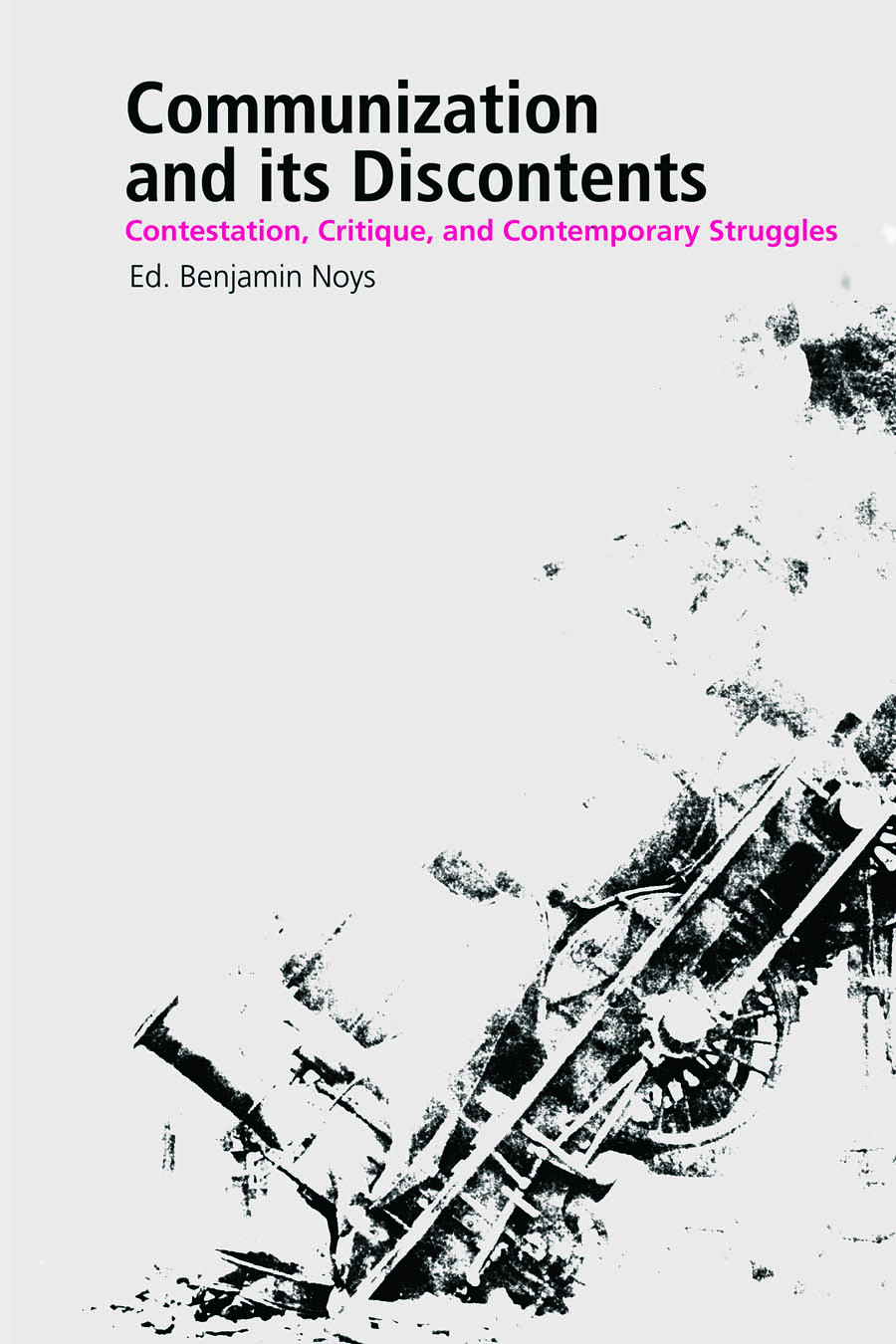Benjamin Noys (ed.): Communization and its Discontents: Contestation, Critique, and Contemporary Struggles (2011)
Filed under book | Tags: · activism, capitalism, commons, resistance

“Can we find alternatives to the failed radical projects of the twentieth century? What are the possible forms of struggle today? How do we fight back against the misery of our crisis-ridden present?
‘Communization’ is the spectre of the immediate struggle to abolish capitalism and the state, which haunts Europe, Northern California and wherever the real abstractions of value that shape our lives are contested. Evolving on the terrain of capitalism new practices of the ‘human strike’, autonomous communes, occupation and insurrection have attacked the alienations of our times. These signs of resistance are scattered and have yet to coalesce, and their future is deliberately precarious and insecure.
Bringing together voices from inside and outside of these currents Communization and Its Discontents treats communization as a problem to be explored rather than a solution. Taking in the new theorizations of communization proposed by Tiqqun and The Invisible Committee, Théorie Communiste, post-autonomists, and others, it offers critical reflections on the possibilities and the limits of these contemporary forms, strategies, and tactics of struggle.”
Contributors: Jasper Bernes, John Cunningham, Endnotes, Alexander R. Galloway, Maya Andrea Gonzalez, Anthony Iles, Leon de Mattis, Nicole Pepperell, Théorie Communiste, Alberto Toscano, Marina Vishmidt, and Evan Calder Williams.
Publisher Minor Compositions, 30 November 2011
ISBN 9781570272318
280 pages
PDF (updated on 2012-7-25)
Scribd
Ephemera: Theory & Politics in Organization journal (2001-2012)
Filed under journal | Tags: · activism, affect, commons, critique, education, finance, immaterial labor, labour, left, multitude, organization, political economy, politics, self-organization, theory, work


Ephemera is the free journal for the discussion of theoretical and political perspectives on all aspects of organization; supported by the School of Business and Management, Queen Mary, University of London.
Editorial collective: Anna-Maria Murtola, Armin Beverungen, Bent Meier Sørensen, Casper Hoedemaekers, Chris Land, Kate Kenny, Lena Olaison, Martyna Sliwa, Michael Pedersen, Nick Butler, Peter Svensson, Sara Louise Muhr, Stephen Dunne, Stevphen Shukaitis, Sverre Spoelstra
ISSN 2052-1499
View issues online:
vol 12, no 4 (nov 2012) — The commons and their im/possibilities
vol 12, no 3 (aug 2012) — Professions at the margins
vol 12, no 1-2 (may 2012) — The atmosphere business
vol 11, no 4 (nov 2011) — Work, play and boredom
vol 11, no 3 (aug 2011) — The effect of affect
vol 11, no 2 (may 2011) — Governing work through self-management
vol 11, no 1 (feb 2011) — Authenticity
vol 10, no 3/4 (nov 2010) — Digital labour: Workers, authors, citizens
vol 10, no 2 (may 2010) — The state of things
vol 10, no 1 (feb 2010) — The excellent institution
vol 9, no 4 (nov 2009) — The university of finance
vol 9, no 3 (aug 2009) — Throwing shoes…
vol 9, no 2 (may 2009) — Project management behind the façade
vol 9, no 1 (feb 2009) — ‘No we can’t’: Crisis as chance
vol 8, no 4 (nov 2008) — Practical Criticism and the Social Sciences of Management
vol 8, no 3 (aug 2008) — University, Failed
vol 8, no 2 (may 2008) — Alternatively
vol 8, no 1 (feb 2008) — Symptoms of Organization
vol 7, no 4 (nov 2007) — Always Elsewhere
vol 7, no 3 (aug 2007) — Local Solidarity
vol 7, no 2 (may 2007) — Marginal Competencies
vol 7, no 1 (feb 2007) — Immaterial and Affective Labour: Explored
vol 6, no 4 (nov 2006) — Experience, Movement and the Creation of New Political Forms
vol 6, no 3 (aug 2006) — América Latina / Latin America
vol 6, no 2 (may 2006) — Organizing between a rock and a hard place
vol 6, no 1 (feb 2006) — In Times, in and as Global Conflict
vol 5, no X (dec 2005) — Web of Capturing the Moving Mind
vol 5, no 4 (nov 2005) — Inscribing Organized Resistance
vol 5, no 3 (aug 2005) — Unwrapped: Let’s Get Out of Here
vol 5, no 2 (may 2005) — The Organisation and Politics of Social Forums
vol 5, no 1 (feb 2005) — Writing:Labour
vol 4, no 4 (nov 2004) — Paid in Full? Writing Beyond the Pale
vol 4, no 3 (aug 2004) — Theory of the Multitude
vol 4, no 2 (may 2004) — No Critique
vol 4, no 1 (feb 2004) — Handle with Care
vol 3, no 4 (nov 2003) — silent sounds
vol 3, no 3 (aug 2003) — Images of Organization
vol 3, no 2 (may 2003) — From…To…
vol 3, no 1 (feb 2003) — Exhibiting
vol 2, no 4 (nov 2002) — Hors d’oeuvre
vol 2, no 3 (aug 2002) — After Organization Studies
vol 2, no 2 (may 2002) — Writing Politics
vol 2, no 1 (feb 2002) — Vorsprung durch Technik?
vol 1, no 4 (nov 2001) — Responding: To Cooper
vol 1, no 3 (aug 2001) — It Appears that Certain Aphasiacs…
vol 1, no 2 (may 2001) — O cursèd spite
vol 1, no 1 (feb 2001) — Castles Made of Sand
PDF (PDF issues, updated on 2013-3-19)
Comment (1)McKenzie Wark: A Hacker Manifesto (2004–) [EN, DE, FR, CR, ES]
Filed under book | Tags: · commons, copyright, floss, free software, gift economy, hacker ethic, hacking, intellectual property

“A double is haunting the world–the double of abstraction, the virtual reality of information, programming or poetry, math or music, curves or colorings upon which the fortunes of states and armies, companies and communities now depend. The bold aim of this book is to make manifest the origins, purpose, and interests of the emerging class responsible for making this new world–for producing the new concepts, new perceptions, and new sensations out of the stuff of raw data.
A Hacker Manifesto deftly defines the fraught territory between the ever more strident demands by drug and media companies for protection of their patents and copyrights and the pervasive popular culture of file sharing and pirating. This vexed ground, the realm of so-called “intellectual property,” gives rise to a whole new kind of class conflict, one that pits the creators of information–the hacker class of researchers and authors, artists and biologists, chemists and musicians, philosophers and programmers–against a possessing class who would monopolize what the hacker produces.
Drawing in equal measure on Guy Debord and Gilles Deleuze, A Hacker Manifesto offers a systematic restatement of Marxist thought for the age of cyberspace and globalization. In the widespread revolt against commodified information, McKenzie Wark sees a utopian promise, beyond the property form, and a new progressive class, the hacker class, who voice a shared interest in a new information commons.”
Publisher Harvard University Press, 2004
ISBN 0674015436, 9780674015432
208 pages
Interview with author: Melissa Gregg (LA Review of Books, 2014).
Reviews: Hua Hsu (Village Voice, 2004), Vince Carducci (PopMatters, 2005), Graham Meikle (Scan, 2005), Brent K. Jesiek (New Media & Society, 2006), A Hacker Manifesto at Twenty (e-flux special issue, 2024, PDF).
A Hacker Manifesto (English, 2004, updated on 2014-9-12)
Hacker-Manifest (German, trans. Dietmar Zimmer, 2005, added on 2018-7-13)
Un manifeste hacker (French, trans. Club Post-1984 Mary Shelley & Cie Hacker band, 2006, added on 2018-7-13)
Hakerski manifest (Croatian, trans. Tomislav Medak, 2006)
Un manifiesto hacker (Spanish, trans. Laura Manero, 2006, added on 2018-7-13)
Manifiesto hacker (Spanish, trans. of a shorter essay, undated, v4, added on 2014-3-6)

